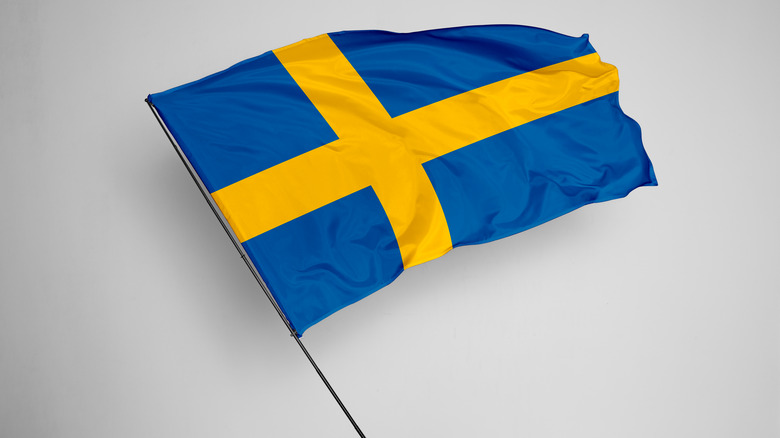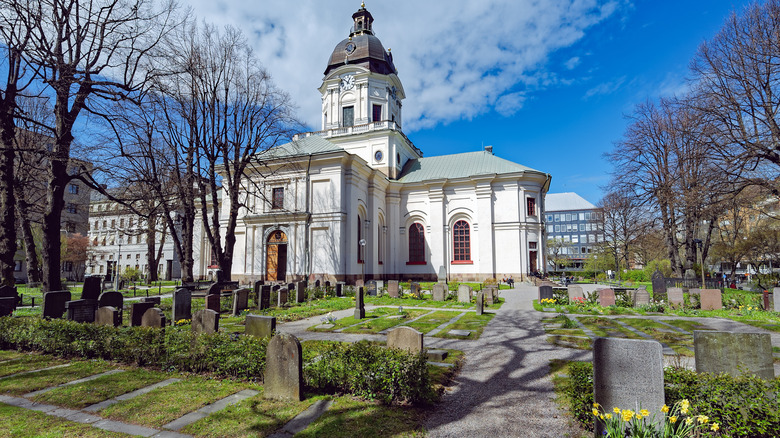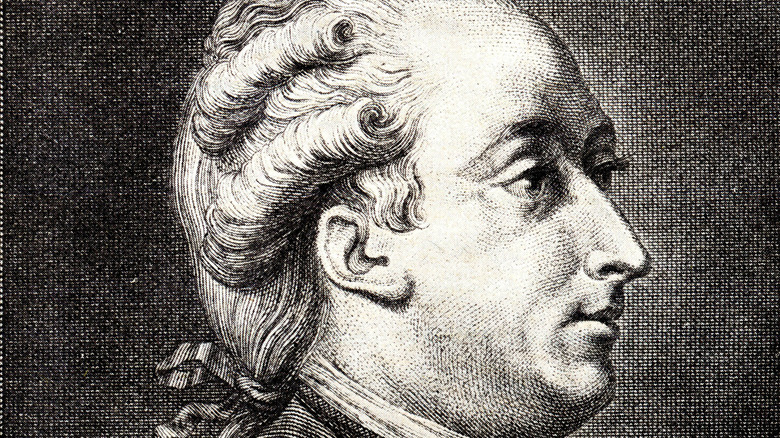The Truth About The Swedish King Who Ate Himself To Death
According to All That's Interesting, King Adolf Frederick of Sweden ruled from 1751 to 1771. Born on May 14, 1710, Ancient Origins writes that he was never meant to be king. As one of the younger sons of his parents, Christian Augustus of Holstein-Gottorp-Eutin and Albertina Frederica of Baden-Durlach, it was unlikely he was ever going to inherit the throne. However, that all changed when his father and childless older brother, Charles Augustus, died. Frederick also has his aunt, Empress Elizabeth of Russia, to thank. Per The Vintage News, Elizabeth's win in the Russo-Swedish War allowed her to place him on the throne.
The war, which (per World History at KMLA) was fought from 1741 to 1743, was partly over Russia's invasion of Finland. Once Elizabeth was victorious, she arranged for Finland to be returned to Sweden on the condition that Frederick was given the crown. The deal was made, and although he had a royal title, Britannica reports that he was nothing but a figurehead. The Riksdag, Sweden's parliament, held all of the power, much to Frederick's chagrin. Ancient Origins reports that, as a result, with the help of his wife, Queen Louisa Ulrika, he attempted but failed to overthrow the Riksdag in 1756.
King Adolf Frederick's uneventful reign
Per Ancient Origins, this disastrous endeavor almost ended Frederick's rule. This did not deter him; he attempted to seize power once again in 1768. Although it seemed that Frederick was on his way to reform his reign and dominate the Riksdag, Britannica writes that this effort did little. His pay was increased but he was still a leader in name only. Despite this, Frederick's time on the throne was seen as dull but tranquil. All That's Interesting reports that the Swedish people thrived, as they were given an increased level of civil freedoms and rights.
According to The Vintage News, this was due to Sweden's progressive parliament, not because of Frederick's efforts. Perhaps it's for this reason that he is remembered not for his life, but for his abnormal and, one might even say, comical death.
Nordstjernan explains that in February 1771, Frederick was getting ready to celebrate Fettisdagen. Also known as "Fat Tuesday” or "Shrove Tuesday," this celebration occurred the day before Ash Wednesday, the start of Lent, and entailed overindulging in foods one might not be able to consume otherwise during the penitential season to come. Frederick overdid it.
The massive meal that killed Adolf Frederick
The Vintage News writes that Frederick's 1771 Fettisdagen feast would be his last. The king consumed large portions of lobster, caviar, kipper, sauerkraut, and champagne (via Nordstjernan). All That's Interesting points out that he also ate meat and turnips. But Frederick's meal was not complete; he was ready for dessert. He then proceeded to devour 14 semla. According to Ancient Origins, this is a cream-filled pastry that was traditionally eaten to celebrate Fettisdagen. It was also one of Fredrick's favorite sweets and he reportedly ate it with a bowl of hot milk with cinnamon and raisins. In one word, this dessert was delectable.
Shortly after gorging himself on this massive meal, Adolf Frederick fell ill and died at the age of 60. Nordstjernan writes that the date of his death has been disputed, but many believe it was on February 12, 1771. Frederick either died from severe indigestion or food poisoning. Whatever the case, the consensus is that the semla were to blame.
Masonry Today reports that Sweden and in particular his loved ones grieved the king. Despite his lack of power, he was said to have been a just and good-natured man. Per Mental Floss, Frederick is not the only notable person in history to have been killed by a meal. Henry I of England and President Zachary Taylor, among others, are said to have died as a result of meals they ate.
His successor was assassinated
After his death, Frederick's son, Gustav III, became the king of Sweden (via Ancient Origins). Unlike his father, The Vintage News states that he was not well liked, as he revoked the freedoms given to the people during Frederick's 20-year reign.While Frederick was known for ruling in a time known as the Age of Liberty, Gustav became infamous for ending that peaceful period (per All That's Interesting). According to Britannica, he succeeded in doing what his father never could: overpowering the Riksdag. Gustav then created a dictatorship-like environment in Sweden.
On This Day writes that although he was a benefactor of the arts and instituted enlightenment-era reforms that included banning torture and religious freedoms, Gustav was unpopular for a number of reasons. First and foremost, he diminished the power of the Swedish aristocracy. He also censored the press and entered into an unpopular war with Russia in 1788.
Moreover, Gustav was known for being a dishonest and complicated person (per glbtq). On March 16, 1792, the king was at a masquerade ball at the Royal Opera in Stockholm when he was shot in the back by a disgruntled nobleman. Gustav III never recovered and died on March 29, 1792, at the age of 46.



